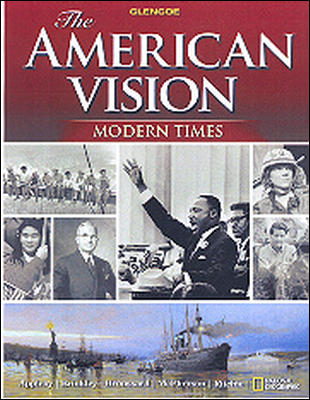The American Vision: Modern Times © 2008Chapter 12:
Roosevelt and the New DealWeb Lesson PlansIntroduction
Students have read how African Americans and women gained a political voice
during the 1940s. In this activity students will research the life of Dr. Mary
McLeod Bethune, the most influential African American of FDR's Black Cabinet.
Lesson Description
Students will use information from Bethune-Cookman College's The Life of Dr.
Mary McLeod Bethune Web site to learn about the African American leader. Students
will read about Bethune's education and career, her role as presidential adviser,
and her work as an international advocate for women and African Americans. Students
will then answer four questions and apply this information by writing a short
monologue that summarizes Bethune's contributions to the struggle for equal
rights for African Americans and women.
Instructional Objectives- Students will identify Mary McLeod Bethune and explain how her activities
impacted civil rights reforms of the first half of the 20th
century. - Students will be able to use this knowledge to write a short monologue summarizing
Bethune's contributions to the struggle for equal rights for African Americans
and women.
Student Web Activity Answers- Born in South Carolina, Dr. Bethune traveled to Illinois, Georgia, and Florida
to teach African Americans. She established schools and worked in jails, sawmills,
and among young people in clubs. She was politically active, registering African
Americans to vote, and organized African American women throughout the Southeast
to combat school segregation and the lack of health facilities for African
American children.
- Bethune worked in many capacities to achieve racial and economic equality
for African Americans. She served as a delegate and adviser to national conferences
on education, child welfare, and home ownership. She was the director of minority
affairs in the National Youth Administration. In this role she issued calls
for national conferences on the problems of African Americans. As the national
commander of the Women's Army for National Defense, she advocated that African
American women had the right to "share in the fight for democracy."
She also lobbied the War Department to commission black women officers in
the Women's Army Corps (WAC). After World War II, she was sent by President
Truman to be a consultant to the charter conference of the United Nations.
- Bethune was the founder of a college, an African American women's club activist,
and a national consultant on racial affairs. She was a national champion for
African Americans' rights, and she was also an independent business leader.
She held interests in a motel, an insurance company, a newspaper, and real
estate. As a national leader, she challenged Americans' racist ideas about
African Americans and women.
- Bethune was pleased with reforms that improved African Americans' lives,
but she realized that these reforms were only the beginning of a long path
toward complete economic and social freedom.
- Students' monologues will vary.
 | 




